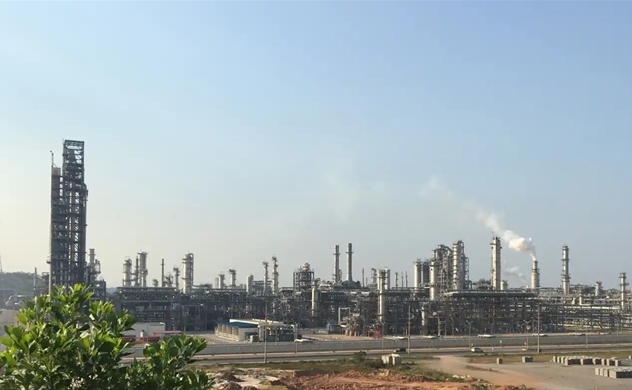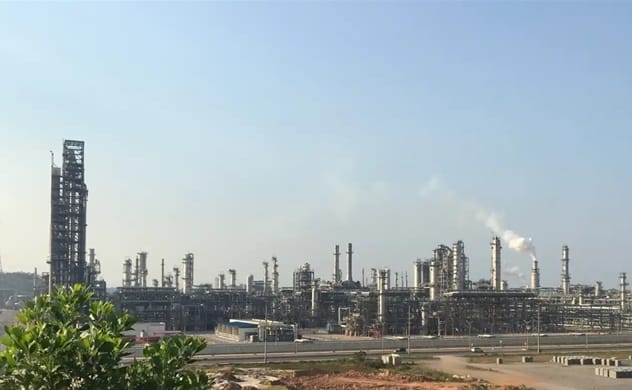
Nghi Son is the largest refinery in Vietnam, but construction delays postponed the start of operations by about a year and a half. Photo courtesy of Idemitsu.
Idemitsu led the launch of the Nghi Son refinery in northern Vietnam in 2018, but diminished demand during the pandemic kept operations low, pushing the business into dire financial straits.
The site is expected to avert a shutdown for now, after cash flow improved in June ahead of a November deadline to pay creditors. But if the petroleum market sours next year, the debt problems for Vietnam’s largest refinery likely would resurface.
Nghi Son is a national project symbolizing economic cooperation between Vietnam and Japan. It is the only overseas refinery where Japanese interests lead management. Of the around $9 billion Nghi Son received in investments, Idemitsu contributed 150 billion yen ($1.07 billion).
The refinery has a capacity to process 200,000 barrels of crude oil daily, meeting roughly 35% of Vietnam’s gasoline demand. Idemitsu is a principal shareholder, owning a 35.1% stake, and the refinery’s president came from the Japanese company.
But the project has faced trials and tribulations. Construction delays postponed the start of operations by about a year and a half. Oil prices tumbled shortly afterward due to the pandemic, and Idemitsu wrote down the value of its stake in the joint venture by 90 billion yen for the year ended in March 2020.
“I never thought it would become this bad,” a person close to Idemitsu said.
Yet these troubles have enabled Idemitsu to essentially turn Nghi Son into a “dojo for developing talent,” President Shunichi Kito said.
The site has produced roughly 300 battle-tested workers who are now tackling projects at other Idemitsu locations. One of them, Tatsuya Matsumoto, spent four and a half years working to bring Nghi Son up and running. He is now at Idemitsu’s Tokuyama complex in western Japan.
Matsumoto joined Idemitsu in 2007 and worked on manufacturing organic compounds at Tokuyama. He volunteered to join the Nghi Son project, hoping to be part of a plant launch that “cannot experienced in Japan.”
After arriving at Nghi Son in 2014, Matsumoto faced a host of troubles. The plant was equipped with state-of-the-art production equipment, but it jammed every time it was turned on. Matsumoto and his co-workers had to shut down the machines numerous times to figure out the cause.
“Trouble that would only occur two or three times in Japan would happen hundreds of times” at Nghi Son, he said.
The Vietnamese staff helped Matsumoto to get the refinery operating.
And the experience was rewarding. “I’ve never felt such a sense of accomplishment in my life,” he said.
When Matsumoto returned to Japan, he jumped onto a project to transform the Tokuyama complex into a receiving terminal for ammonia, a next-generation energy source.
“It’s interesting to start from scratch on something that has no precedent,” said Matsumoto, an attitude he owes to his experience in Vietnam.
Others who worked in Nghi Son went on to apply themselves in solid-state-battery materials or even join upper management.
“The hardships led to self-confidence,” Kito said. Idemitsu’s rivals believed that building a refinery in Vietnam was reckless, but the facility also produced talent that is now supporting the company.
Idemitsu’s history is full of daring challenges and subsequent setbacks.
When Japan was defeated in World War II, the company lost almost all operations and assets.
In the 1990s, the company faced a serious financial crunch as it refused to take itself public in order to remain true to the ideals of founder Sazo Idemitsu.
Now Idemitsu faces a new challenge in the global shift to reduce carbon emissions.
“Since we started, Idemitsu has had a history of taking on difficult forays, such as overseas expansion,” Kito said. “Just like with the Vietnamese operation, we develop people through the process of responding to difficult challenges.”
Source: Nikkei Asia





